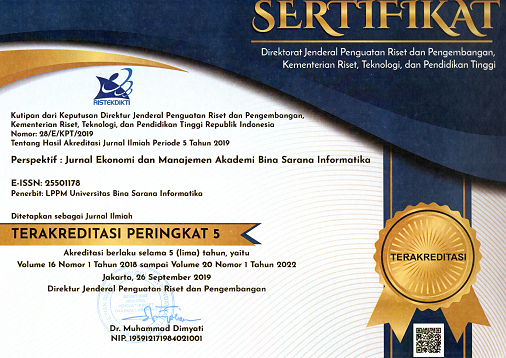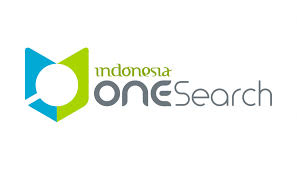ANALISA PENGARUH FREE CASH FLOW, AUDIT INTERNAL, LIKUIDITAS, LEVERAGE DENGAN DISCREATIONARY ACCRUAL Pada PT. ALSY
Abstract
Full Text:
PDFReferences
Ali Khan, M. N. A. bin, & Omar, N. A. B. (2013). A study of importance items of internet financial reporting: A case of malaysian auditors. Middle East Journal of Scientific Research. https://doi.org/10.5829/idosi.mejsr.2013.18.3.11902
Andi Martias. (2017). Interaksi pengalaman, indenpendensi, kompetensi, etika auditor dan insentif moneter terhadap hasil pemeriksaan. Konfrensi Nasional Ilmu Sosial Dan Teknologi.
Andi Martias. (2019). LEMAHNYA PENGENDALIAN INTERNAL BERDAMPAK MARK UP BIAYA PENGAWALAN DI PERUSAHAAN PT ALRSY.
Cahan, S. F., & Sun, J. (2015). The Effect of Audit Experience on Audit Fees and Audit Quality. Journal of Accounting, Auditing and Finance. https://doi.org/10.1177/0148558X14544503
Décamps, J. P., Mariotti, T., Rochet, J. C., & Villeneuve, S. (2011). Free Cash Flow, Issuance Costs, and Stock Prices. Journal of Finance. https://doi.org/10.1111/j.1540-6261.2011.01680.x
Diamond, J. (2013). Internal control and internal audit. In The International Handbook of Public Financial Management (pp. 374–395). https://doi.org/10.1057/9781137315304
Ghozali, I. (2011). Aplikasi Analisis Multivariate Dengan Program IBM SPSS 19 (edisi kelima). Aplikasi Analisis Multivariate dengan program SPSS. https://doi.org/10.9744/jmk.10.2.pp. 124-135
Iqbal, M. ., & Ritonga, A. . (2018). OPTIMALISASI PORTOFOLIO SAHAM-SAHAM LQ-45 DENGAN MENGGUNAKAN CAPITAL ASSET PRICING MODEL. KARISMATIKA: Kumpulan Artikel Ilmiah, Informatika, Statistik, Matematika Dan Aplikasi. https://doi.org/10.24114/jmk.v4i1.11859
Koo, J.-H., Song, S., & Paik, T.-Y. (2015). Earning Management and Cost stickiness. https://doi.org/10.14257/astl.2015.84.09
Liu, C., & Yang, D. (2008). The Effect of the CEO/CFO Certifications on Earnings Management. Journal of Theoretical Accounting Research.
Maaloul, A., & Zéghal, D. (2015). Financial statement informativeness and intellectual capital disclosure. Journal of Financial Reporting and Accounting. https://doi.org/10.1108/jfra-04-2014-0023
Martias, A. (2019a). Analisa Peran Komunikasi dan Psikologi Audit Dalam Proses Audit di PT.Alarsy. Persepektif.
Martias, A. (2019b). ANALISA PERANAN KOMUNIKASI DAN PSIKOLOGI AUDIT DALAM PELAKSANAAN TUGAS DI PT ALARSY. Jurnal Perspektif. https://doi.org/10.31294/jp.v17i1.4791
Suyono, E. (2017). Bebagai Model Pengukuran Earnings Management : Mana Yang Paling Akurat. Sustainable Competitive Advantage-7 (Sca-7) F.
Widyanto, M. L., Kwarto, F., & Kurniawati, S. (2018). PENGARUH KOMPETENSI, ETIKA, DAN PENGALAMAN KERJA TERHADAP KUALITAS AUDITOR INTERNAL. Jurnal Profita, 11(2), 165. https://doi.org/10.22441/profita.2018.v11.02.002
Wiyanti, R. (2018). ANALISIS PENGARUH 7 DAY RATE REPO, INFLASI, NILAI TUKAR, DAN PDB TERHADAP INDEKS HARGA SAHAM SEKTOR PROPERTI (STUDI EMPIRIS DI BURSA EFEK INDONESIA). Jurnal Akuntansi : Kajian Ilmiah Akuntansi (JAK). https://doi.org/10.30656/jak.v5i2.666
Yaari, U., Nikiforov, A., Kahya, E., & Shachmurove, Y. (2016). Finance methodology of Free Cash Flow. Global Finance Journal. https://doi.org/10.1016/j.gfj.2015.05.003
DOI: https://doi.org/10.31294/jp.v18i1.7195
Copyright (c) 2020 Jurnal Perspektif
dipublikasikan oleh LPPM Universitas Bina Sarana Informatika Jakarta
Jl. Kramat Raya No.98, Kwitang, Kec. Senen, Kota Jakarta Pusat, DKI Jakarta 10450

This work is licensed under a Creative Commons Attribution-ShareAlike 4.0 International License









